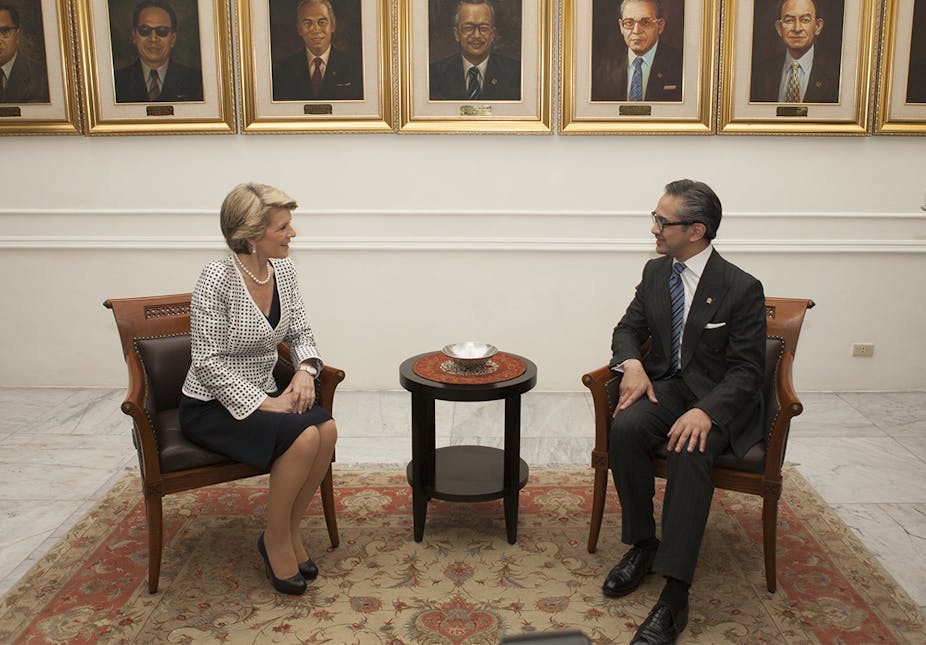Australia and Indonesia have agreed on a code of conduct on intelligence co-operation, with Australia pledging never to use its spy agencies in ways that could harm Indonesia’s interests.
Today’s signing of the agreement closes the the rift that opened between Australia and Indonesia after last year’s revelation from documents leaked by Edward Snowden that Australia had tapped the phones of Indonesian president Susilo Bambang Yudhoyono’s inner circle, including his wife.
Indonesian public has moved on
What does the signing mean for Indonesia?
For the general Indonesian public, the agreement doesn’t mean much, judging by the lack of interest. When the scandal blew up in November 2013, there was an outpouring of anger in Indonesia.
Nearly a year later, Indonesians in general seemed to have forgotten about the scandal. News of the signing of the code of conduct didn’t generate much of a stir.
It is possible that the current debate about lifting fuel subsidies in Indonesia buried the story. But, in general, people simply don’t care anymore about the spying scandal.
Face-saving formula for SBY
But for Yudhoyono, better known as SBY, it means a lot. For him, it is a face-saving formula to make up for the personal affront by Australia for spying on his wife. Therefore, the signing of the code of conduct had to be done on his watch, before president-elect Joko Widodo succeeds him in October.
Indonesian officials understand that the relationship with Australia is simply too important to be damaged by a spying scandal. Even during the early days of the crisis, the Indonesian government tried to limit the damage from the uproar over Snowden’s revelations.
As early as August 2013, the head of Indonesia’s State Intelligence Agency (BIN), Lieutenant-General Marciano Norman, played down the scandal. He was quoted in Kompas and Tempo as stating that Snowden should not be trusted. According to Marciano, because of Snowden’s dislike of the United States, he wanted to wreck the US relationship with other members of the G20 group of nations.
It was only when the news broke that Australia had also targeted Ani Yudhoyono that SBY reacted in anger. In essence, it was one thing spying on officials, but Australia went too far by spying on the president’s family. This was seen as an insult.

For SBY, if he did not react in anger, it could have also been a public relations disaster. People would question why their nation’s leader would just take such a major humiliation on the chin. It might suggest he was beholden to Australia’s interests.
What Indonesia needed when the scandal surfaced was a face-saving apology from Australia. When that was not forthcoming, the dispute escalated. The Indonesian ambassador to Australia was recalled. Military cooperation was halted.
I had the opportunity of a chat with Australia’s former prime minister, Kevin Rudd, when we met in Halifax during this crisis. Rudd said that he would have acted differently from prime minister Tony Abbott and moved quickly to defuse the crisis.
Despite all this, Australia and Indonesia view their bilateral relationship seriously. After their governments finally agreed to discuss a code of conduct the relationship started to improve rapidly. Both countries tried to normalise the relationship in spite of the Indonesian anger.
Indonesia highly values its defence ties with Australia, as a way to help its military become more professional. It also regards Australia as a major player in southeast Asia, which thus needs to be taken seriously.
An end to the spying?
The signing of the code of conduct does not mean the end of spying for Australia. And Indonesia is not that naïve to think that the agreement is going to stop Australia from spying. It is a given that nations spy on each other and Indonesia has many experiences of dealing with spies.
The real purpose of the agreement, in addition to being an indirect apology, is to eliminate unwelcome surprises like the Snowden affair, by specifying that there’s a “code of honour”, a line that Australia should not cross. Wiretapping the president’s wife is out of the question.
Aside from the intentions behind the agreement, the code of conduct actually has practical use for the bilateral relationship. The agreement creates opportunity for more intelligence cooperation between Indonesia and Australia, especially in light of the threats from terrorism and organised crimes.

